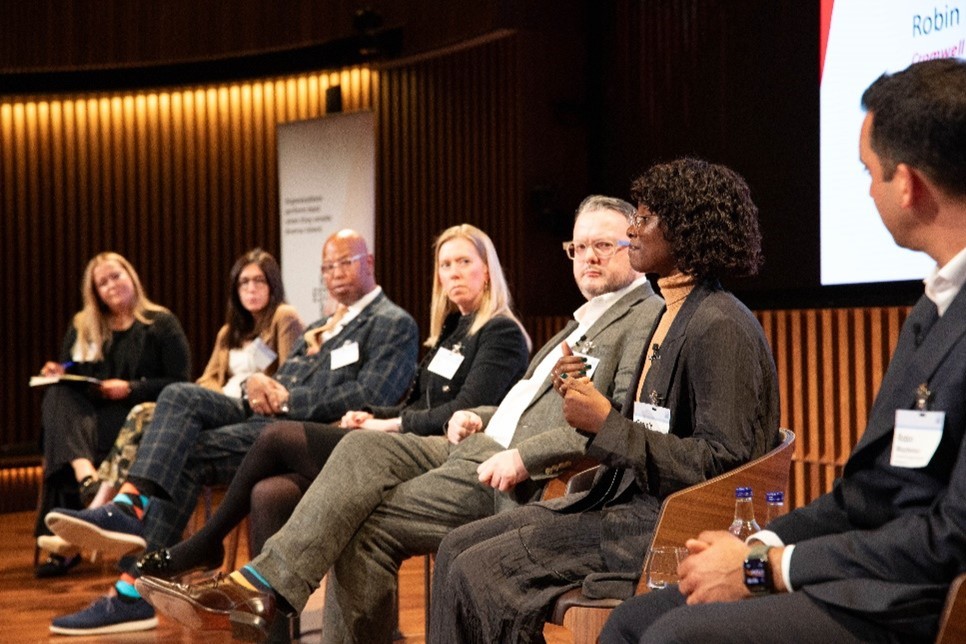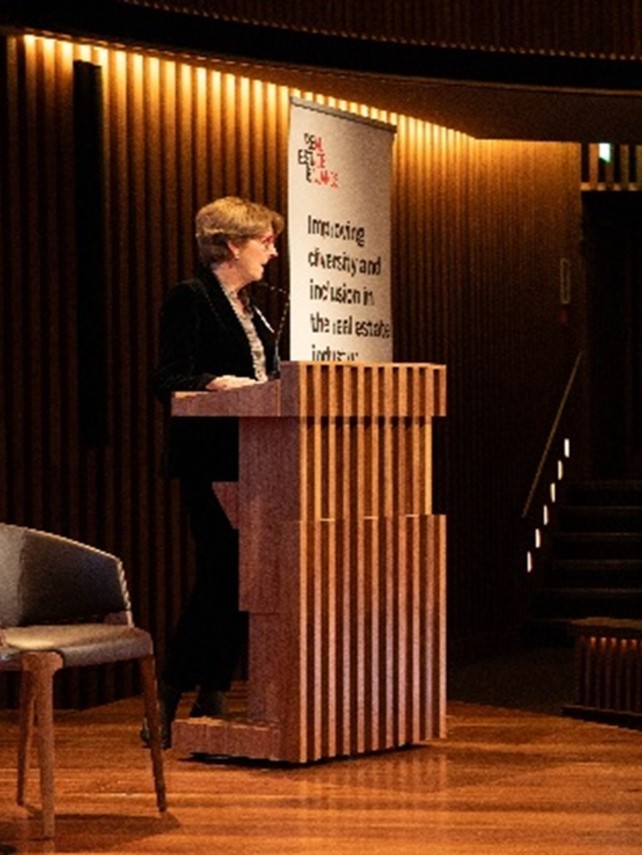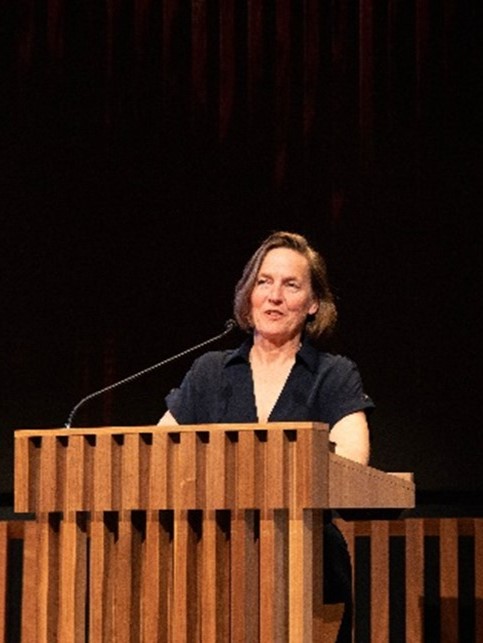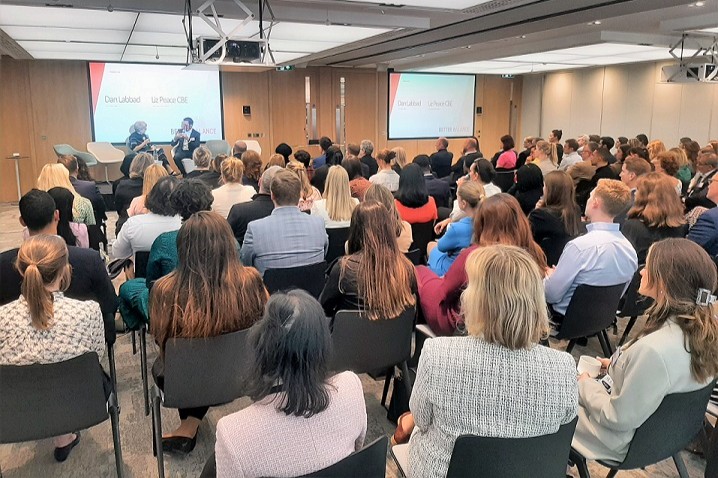By joining Real Estate Balance’s email list, you agree to receive email updates from time to time about organisation news, events being held and information about our partners in accordance with the terms outlined in our privacy notice, which you can read in full here.
Sign upCelebrating equity, diversity and inclusion in real estate at Better Balance III

Real Estate Balance recently held our third annual Better Balance event to take the temperature of equity, diversity and inclusion (EDI) in UK real estate and associated sectors, this time at Goldman Sachs in London.
As well as celebrating the progress and best practice seen in the past year at our 128 members, the event saw a host of industry professionals discuss the shared challenges we face to ensure our industry is inclusive and representative of the communities we are vital parts of.
Richard Spencer, Head of Real Estate in Europe at Goldman Sachs, and Sue Brown, our Managing Director, welcomed the 180 attendees to the discussion and introduced the two keynote speakers:
- Simon Carter - Chief Executive, British Land
- Jessica Hardman - CEO and Head of European Real Estate Portfolio Management, DWS UK
Simon and Jessica will be the next Presidents of the British Property Federation and Sue moderated their conversation.
They started by talking about what attracted them to working in real estate in the first place and what EDI means to them as a value in their careers.
Jessica said that she has had role models to look up to and so EDI for her means giving back to the upcoming generation of professionals. Simon highlighted the centrality of real estate in our society, with approximately 40% of people in Britain visiting a British Land asset in any given year. He added that events like Better Balance are important for facilitating the sharing of best practice and for learning new EDI strategies and activities that can be implemented at attendees’ organisations.
Simon was asked about British Land setting public targets when it comes to workforce diversity and reducing its gender and ethnicity pay gaps. He said that where it is possible, EDI should be treated like other areas of his business, where collecting data and setting targets is the norm, and that making the aspirations public holds him and other senior leaders to account.

DWS, which operates in multiple markets, has also set targets relating to gender representation for its senior leadership with the aim of improving performance.
We’re in the business of creating returns for our investors, and we want to see people innovating, we want to retain talent, we want people to turn up with a can-do attitude, we want to be the best in class - and we see that when we put people in a diverse environment.
Jessica Hardman
Jessica was asked what she considers to be the biggest EDI challenges facing our industry and she pointed out that the vast majority of money managers in the UK are men. She also advocated for companies to do more to encourage employees to share their diversity data in order to paint a more accurate picture of, for example, the social backgrounds of the people in our industry.
Both Simon and Jessica were also asked about employee resource groups, with many embedded at both British Land and DWS and covering areas including gender, ethnicity, wellbeing and more.
Simon said the groups were at the heart of EDI at British Land, citing enhanced parental policies and practices and reverse mentoring as two successful initiatives which had been introduced at the behest of employee resource groups.
Jessica said these networks and groups at DWS played an important role in “connecting the dots globally” across such a large organisation. A new initiative at DWS has seen each investment team joining up with one of the employee resource groups to sponsor an event or activity, which has led to more engagement with EDI across the company.
The keynote conversation also saw an up-and-coming professional at British Land pose a question to Jessica and a peer at DWS to do the same for Simon.
Alex Mortimer, Development Analyst at British Land, asked Jessica how NextGenners can help senior leaders with their EDI ambitions, and she answered by saying that she wants honesty from her more junior colleagues when it comes to their views on whether change is happening fast enough and holding senior leadership to account on progressing EDI at the company.
Georgina Anderson, Asset Management Analyst at DWS, asked Simon about fostering inclusivity in the context of EDI targets versus meritocracy.
We don’t do positive discrimination at British Land, we are a meritocracy, but what we do believe in is levelling the playing field and ensuring everyone is equipped to grasp opportunities as they arise to allow us to bring talent through the business.
Simon Carter
Following the discussion between Simon, Jessica and Sue, panellists from organisations across our membership took to the stage to talk about the EDI successes and challenges at their companies, share their thoughts on progressing inclusive behaviours and cultures in the workplace and answer questions from attendees.
The panel comprised:
- Emma Guthrie - Partner, Shepherd and Wedderburn, and co-Chair of the Real Estate Balance NextGen committee
- Ana Estrada - Managing Director, Europe, Goldman Sachs Real Estate Asset Management
- Clarence Dixon - Global Head of Loan Services, CBRE, and Real Estate Balance Board Director
- Will Kirkpatrick - Head of Hotels and and Extended Stay, Gerald Eve LLP
- Georgie Manly - Retail Customer Propositions Director, Landsec, and Black Women In Real Estate committee member.
- Robin Macpherson - Head of Risk, Europe, Cromwell Property Group
- Kate Hammar - Director and Head of Real Assets, Per Ardua

Emma, the moderator of the discussion, started the conversation by highlighting research of the under-35s and those in the first ten years of their real estate career by her committee which found that participants want their organisations to focus on culture in the ‘new normal’ of hybrid working, empowering people to speak up in the face of inappropriate attitudes and behaviours, change beyond one’s own organisation and encouraging allyship and collective responsibility.
Kate elaborated on Simon’s question from Georgina, pointing out that as an executive search and leadership advisory business, Per Ardua is completely focused on finding the best people for their clients. However, by embedding EDI internally and taking steps such as challenging hiring managers on their interview and assessment practices, the majority of the placements the company has facilitated in the past year have been candidates with underrepresented characteristics.
Georgie picked up on the importance of ‘practising what you preach’ internally alongside how you operate with partners and in the communities you operate when it comes to EDI. She said the new EDI strategy at Landsec has been in place for almost a year and was developed with input from colleagues across the organisation, not just those in people-focused and HR roles, through collaborative workshops. EDI has also been integrated into everyone’s performance objectives at the company to further the sense of ownership of such values.
Emma asked the panel for their views on hybrid working and its implications for inclusion, and Robin said that organisations which implement a hybrid environment should be clear with colleagues about what is expected, and also realistic about the challenge of trying to replicate the organic interactions which happen naturally in the office.
Georgie added that people with underrepresented protected characteristics were already the minorities in many spaces and that not being in the office risked them becoming even less visible. Kate warned that presenteeism was returning with challenging market conditions making people fearful of redundancy. William shared his observation that this was reflected in the fact that company car parks, which had not been full on Mondays for a few years, have again started filling up at the beginning of the week.
William also answered a question on what the industry can do to attract a more diverse range of people. Having had a non-traditional route through his career so far, he said he was an advocate for apprenticeship schemes. On the topic of authenticity, he said he approaches it by encouraging the junior members of his team to be their whole selves at work, and then following up individually and providing guidance if anyone falls slightly short of displaying appropriate cultural competencies. Robin confessed to having “a bit of a chip on his shoulder” when he was younger, likely as a result of the culture shock that came with moving from Scotland to the Home Counties, and he reflected on the challenges of bringing your whole self to work and understanding the boundaries of a work environment where you are a minority.
People ask me: why I do walk around the building every day? Well, the reason is that I am looking for behaviours that people often don’t know they are doing. And that’s because my sole goal is to make sure that everyone who walks through our doors feels safe, that they can be whoever they want to be and that they have the opportunity to grow no matter where they’ve come from or the colour of their skin or their gender.
Clarence Dixon
Ana said that a person trying to be someone they are not or trying to replicate the personalities of others would quickly tire themselves out, and it is far more beneficial to instead encourage people to try to be the best version of themselves. She spoke about being the first Spanish person in her department, let alone the first Spanish woman, and that earlier in her career she found it challenging to be her authentic self at work. Companies have a responsibility to develop cultures where people feel safe to be authentic, and that by doing so they benefit from their staff having more self-confidence, she said. Ana added that this environment-building and confidence-building are absolutely critical to the success or otherwise of an organisation.


The formal part of Better Balance III ended with some exciting news before attendees had the chance to network with the speakers and each other.
Suzanne Avery, the vice-Chair of our Board of Directors, announced that Jo Davis, Principal, Managing Director of Place and UK Executive Chair at Avison Young has been appointed as the new Chair of Real Estate Balance.
Jo has taken over from Liz Peace CBE. Liz Chaired Real Estate Balance during the pandemic, oversaw the broadening of our focus from gender equality to include ethnicity and social mobility and has been fundamental to the expansion of our regional activities in the past few years.

All of us at Real Estate Balance are very thankful to Liz for being such a fantastic Chair and are looking forward to the future under Jo’s stewardship.
We are also very thankful to Goldman Sachs, Richard, Simon, Jessica, Emma, Robin, Clarence, Kate, Georgie, William and Ana and also to everyone who attended and contributed to making Better Balance III such an inspiring and insightful event.
The search to appoint Jo as the new Chair of Real Estate Balance was conducted on a pro-bono basis by Granger Reis. All photos by Emma Hill.

